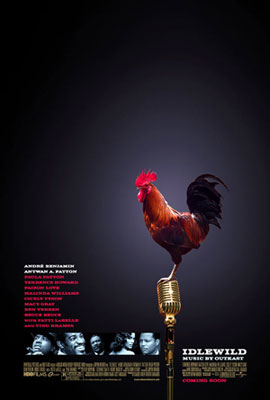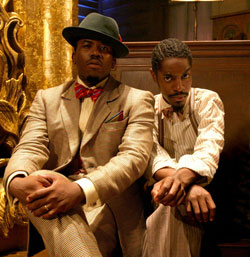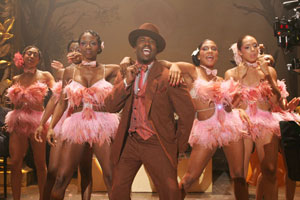 Bryan Barber’s making the big leap from music videos to feature films with Idlewild, opening this weekend. But he’s not making it alone – he’s going with Andre Benjamin and Big Boi, his friends from OutKast. Barber and OutKast have already had a prolific and creative partnership with videos like the award-winning Hey Ya.
Bryan Barber’s making the big leap from music videos to feature films with Idlewild, opening this weekend. But he’s not making it alone – he’s going with Andre Benjamin and Big Boi, his friends from OutKast. Barber and OutKast have already had a prolific and creative partnership with videos like the award-winning Hey Ya.
Idlewild is a musical, but that’s not all – it’s a period musical. The OutKast guys play the roles you would expect, with Big Boi as a gangster and Andre as the sensitive artist; the movie is also filled with top notch talent like Terence Howard, Cicely Tyson, Ving Rhames and Ben Vereen. It’s a big first feature for Barber. Last weekend I had the chance to get on the phone with him for a couple of minutes and we talked about the transition from music videos to features and the challenges of doing a musical.
Q: A lot of music video directors have gone on to become successful in the world of feature films. It seems to me that the big difference between the two is that a video is a sprint – you’re only shooting a day or two – while the feature film goes on weeks and weeks, and is more like a marathon. What’s been the adjustment like for you?
Barber: Well, you just explained it! The adjustment is really pacing myself for a long term engagement and trying my best to keep my focus on getting all the elements necessary to make the film its best. It’s important to me to be passionate about what I’m doing; you have a lot more obstacles to face when you’re doing a feature, so it’s very important I have a certain invested interest that’s more than just money. It really helps you when you have to push for things other people might not understand, elements that you think will take the film to another level. You have to feel passion for the story and passion for the characters.
Whereas music videos at the end of the day it serves the purpose of promoting an album, selling some records. At the end of the day you’re doing work for hire, so the attachment to  the piece is not as important personally. With music videos you just want to have fun and do the best job with the least amount of resistance. You always want to have a product you’re proud of, but ultimately music videos are something you’re doing to sell something.
the piece is not as important personally. With music videos you just want to have fun and do the best job with the least amount of resistance. You always want to have a product you’re proud of, but ultimately music videos are something you’re doing to sell something.
People don’t attach a director like David Fincher to any specific music video. Michel Gondry, once he crossed over, even though he did so many great music videos people attach him to Eternal Sunshine of the Spotless Mind. A feature film is something that really follows you, so you have to pay attention to it more.
Q: It’s interesting that you bring up Michel Gondry. I spoke to him recently and he said that he would like to do more hip hop videos but when he meets with the artists he finds them too interested in doing cliché stuff. You’re well known for doing hip hop videos that are anything but cliché – how do you pull that off? Is it because you’re close to the artists, is it just that you refuse to go that way?
Barbour: I think it’s a mixture of both. It’s very hard for me to do a video that I feel is cliché – I can’t even write them because I don’t pay attention to them. If I even feel a song is cliché I can’t write for them. Again, to me passion is important. I don’t invest my time in something that is ultimately going to be a fly by night project. My time is valuable. Although money is important – but at the same time you want to walk away feeling proud of what you’ve done.
Clichés are very boring – unless you take the cliché and exaggerate it and make fun of it. I just stay away from doing what’s expected.
Q: With Idlewild you’re working on a musical. Even though people will assume, ‘Oh, he’s a music video director, musicals will be easy for him,’ I’m assuming there’s a layer of added difficulty to doing a musical because it’s so technically specific.
Barbour: I was trying to reinvent the genre of the musical. If you can imagine Batman Begins – before you went to see that film you had a certain reference of comic book films having a certain hokey quality to them, but Batman Begins took it in a whole new direction. You can imagine that whole genre of film being so edgy.
Begins – before you went to see that film you had a certain reference of comic book films having a certain hokey quality to them, but Batman Begins took it in a whole new direction. You can imagine that whole genre of film being so edgy.
So for the musical I wanted to reinvent the genre and make a connection to this new generation of people who have come up watching MTV and BET and music videos. Whereas in the past films like West Side Story or Sound of Music worked a number of ways, one of the great things was that people had no visual reference points for musical performances they would see every day. But as television started to evolve, music videos became a bigger factor in our culture. I think that was missed in musicals, except for in the work of guys like Baz Luhrmann or in Chicago. But I wanted to try to take it there in a different way for hip hop, and jazz and bebop.
Q: What was the collaboration between you and OutKast on this?
Barbour: Being the writer of the film, I depended on them solely to deliver this music. I could never have gotten through it. They were my Gershwin, so to speak. They delivered these songs I could really weave into the storyline. It was an even exchange – I needed them to keep the audience invested in the film, in the storyline and in the music. I needed to also use them to apply themselves and commit to the characters, to commit to the performances on the screen. They gave me 120% in terms of wanting to be taken seriously, in terms of wanting to understand how to cross over from being music stars into being actors. The greatest compliment I hear when people see the film is that they didn’t see Big Boi and Andre – they didn’t see OutKast in the film. They saw Percival and Rooster, the two characters.